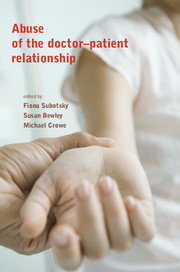Book contents
- Frontmatter
- Contents
- List of figures, tables and boxes
- List of contributors
- Foreword
- Introduction: mapping the territory
- 1 The ethical importance of boundaries to intimacy
- 2 The patient's perspective: impact and treatment
- 3 Teaching ethics and ethical behaviour to medical students
- 4 With the benefit of hindsight: lessons from history
- 5 The prevalence of boundary violations between mental health professionals and their clients
- 6 Psychiatry: responding to the Kerr/Haslam Inquiry
- 7 The general practitioner and abuse in primary care
- 8 Boundaries and boundary violations in psychotherapy
- 9 Sexual therapies: ethical guidelines, vulnerabilities and boundaries
- 10 Obstetrics and gynaecology: a special case?
- 11 Nurses as abusers: a career perspective
- 12 Medical management: governance and sexual boundary issues
- 13 Dealing with offending doctors: sanctions and remediation
- 14 Defending doctors: the protection society's experience
- 15 Regulation and its capacity to minimise abuse by professionals
- 16 The role of the General Medical Council
- Appendix 1 Extract from Vulnerable Patients, Safe Doctors
- Appendix 2 Codes of ethics of psychiatric associations in other countries
- Appendix 3 Guidance from the Council for Healthcare Regulatory Excellence
- Appendix 4 Examples of determinations by the General Medical Council's Fitness to Practise panels
- Appendix 5 Website resources and information
- Index
- Plate section
6 - Psychiatry: responding to the Kerr/Haslam Inquiry
Published online by Cambridge University Press: 02 January 2018
- Frontmatter
- Contents
- List of figures, tables and boxes
- List of contributors
- Foreword
- Introduction: mapping the territory
- 1 The ethical importance of boundaries to intimacy
- 2 The patient's perspective: impact and treatment
- 3 Teaching ethics and ethical behaviour to medical students
- 4 With the benefit of hindsight: lessons from history
- 5 The prevalence of boundary violations between mental health professionals and their clients
- 6 Psychiatry: responding to the Kerr/Haslam Inquiry
- 7 The general practitioner and abuse in primary care
- 8 Boundaries and boundary violations in psychotherapy
- 9 Sexual therapies: ethical guidelines, vulnerabilities and boundaries
- 10 Obstetrics and gynaecology: a special case?
- 11 Nurses as abusers: a career perspective
- 12 Medical management: governance and sexual boundary issues
- 13 Dealing with offending doctors: sanctions and remediation
- 14 Defending doctors: the protection society's experience
- 15 Regulation and its capacity to minimise abuse by professionals
- 16 The role of the General Medical Council
- Appendix 1 Extract from Vulnerable Patients, Safe Doctors
- Appendix 2 Codes of ethics of psychiatric associations in other countries
- Appendix 3 Guidance from the Council for Healthcare Regulatory Excellence
- Appendix 4 Examples of determinations by the General Medical Council's Fitness to Practise panels
- Appendix 5 Website resources and information
- Index
- Plate section
Summary
Introduction
The Kerr/Haslam Inquiry was set up by the Secretary of State for Health in 2002 under the chairmanship of Nigel Pleming QC. Its remit was to look at how the National Health Service (NHS) handled allegations regarding the performance and conduct of two consultant psychiatrists who worked for the same psychiatric hospital in York, north Yorkshire, in the 1970s and 1980s (Department of Health, 2005). In 2000 William Kerr had been convicted (in his absence, on a trial of the facts) of one count of indecent assault; by 2003 Michael Haslam had been convicted of four counts of indecent assault, and a conviction of rape had been quashed on appeal. Complaints had apparently been received over many years, with little to no response, and more complainants came forward during the course of the Inquiry. The details of the complaints are quoted from the Inquiry report in Boxes 6.1 and 6.2.
Request for information by the inquiry
The Royal College of Psychiatrists (RCPsych) was formally asked for comments on its policies and views over the period 1961–2004. What follows in this section is an abridged version of the response by the author on behalf of the College.
Box 6.1 The complaints against Michael Haslam
Michael Haslam took up his post as Consultant in Psychological Medicine at Clifton Hospital, York, and Harrogate District Hospital in 1970. …
During the course of the Inquiry we received evidence indicating that at least eight patients had, during his time in York, raised concerns about his alleged sexual advances towards them. Many of the allegations involved offering friendship and social activities outside of the clinical setting, leading later to the development of a personal, sexual relationship. …
The number of patients who have subsequently come forward alleging that they were sexually propositioned or assaulted by Michael Haslam brings the total number of those who have now made allegations against him to at least 10.
The first complaint against Michael Haslam known to us occurred in 1974 when Patient B1 informed her GP, that (allegedly) she had been having an affair with Michael Haslam.
- Type
- Chapter
- Information
- Abuse of the Doctor-Patient Relationship , pp. 64 - 77Publisher: Royal College of PsychiatristsPrint publication year: 2010

